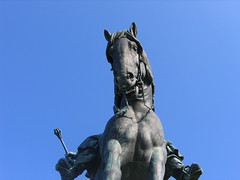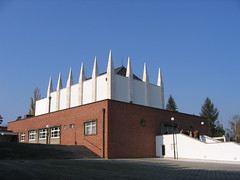Disco Mausoleum
Well, apparently the veterans were offended when the wife of the governor of Central Bohemia rented the place for a disco party complete with "scantily clad dancers." To me, it sounds like the perfect place for a Halloween party. You could even have fires in the braziers.
More pictures of the monument were recently featured at the MyCzechRepublic blog. There were a lot of other interesting articles up today at Radio Prague, including: a response to author Ludvík Vaculík's new book, Improved Songs (the article's picture of Vaculík performing also shows cimbalomist Jan Rokyta from Ostrava); Coilin O'Connor interviews filmmaker and music writer Simon Broughton, a guest of the MOFFOM festival;* and David Vaughan talks to journalist Martin Simecka about the paradoxes of October 28th and recognizing a non-existent state.
*Commentary and thoughts on the state of folk music, perhaps a neo-disco mausoleum: Broughton said, "I think it's fantastic that there's been a sort of revival here in this sense [i.e., traditional music]. During the communist period all this music became rather cheap and sanitised and corrupted. There's now a new generation of people who are sort of reinterpreting the music and going back to its real rustic roots, not this "fakelore" as one could describe it, which was generated by the former regime." This is a commonly heard sentiment among English speakers, but not that many people that I've talked to actually characterize the situation as such. First, the idea of "fakelore" was popularized in discussions of British and American folklore (by folklorist Richard Dorson, I think, though I haven't the resources to check at the moment) and, I think, bears little relation to the situation in central Europe. A similar idea is Eric Hobsbawm's "invented tradition" concept. Both of the ideas imply that cultural expressions utilized in ideological ways are somehow less valuable than "clean" ones. Of course, no cultural expression is devoid of ideology, some ideologies are just more acceptable (and less visible) to the majority in certain times and places. Second, many of the "cleaned up" or folklorized versions of Moravian music came from the 1920s and 1930s, not the Communist regime. Third, folklore as regional expression was popular long before Communism, and it is always somewhat of a niche genre—just as everybody doesn't listen to rap music, not everybody listens to cimbalom bands. If "folk music" in south Moravia was sanitized during the 1960s and 1970s, and if it really saw a decline in homegrown musicians (so to speak), these conditions must have had much to do with the urbanization of the previous hundred years as much as the political situation. State support of music through festivals, radio, and folk troupes certainly increased during Communism, but those were not necessarily signs that the music declined. The indicator of that should be how individuals think about and consider the tradition, and it seems that Moravians tend to take their song personally (and with a glass of wine) rather than politically. This latter concept—music as individual experience and expression—is another way to gauge the health of a tradition. Despite the novel's neo-Romanticism, that may have also been what Milan Kundera concluded in his 1967 novel Žert (The Joke).
Tags: music, czech, discursions, links, halloween


 A graduate student in music and anthropology writing a dissertation about music in Moravia, the eastern third of the Czech Republic. At some point, the Czech Republic's "second city" (that would be Brno) captured my attention, and I've since been blogging about events, arts, music, and other stuff—basically whatever interests me in and around the cityscape. I'm not living in Brno now, but I keep up with the cultural pulse from afar as best I can.
A graduate student in music and anthropology writing a dissertation about music in Moravia, the eastern third of the Czech Republic. At some point, the Czech Republic's "second city" (that would be Brno) captured my attention, and I've since been blogging about events, arts, music, and other stuff—basically whatever interests me in and around the cityscape. I'm not living in Brno now, but I keep up with the cultural pulse from afar as best I can.


Comments:
After having been to said monument I agree; that would be a most bitchin place to have an awesome halloween party. Definately a plus with the already-in-place braziers. Old fogeys be damned! it's time to party!
for the record; my halloween consisted of nothing. I believe I drank the weekend before and went to work the day of and forgot to even wear a neat hat since all I do is work anymore. *sigh*
5:59 AM, November 08, 2006
» Post a Comment